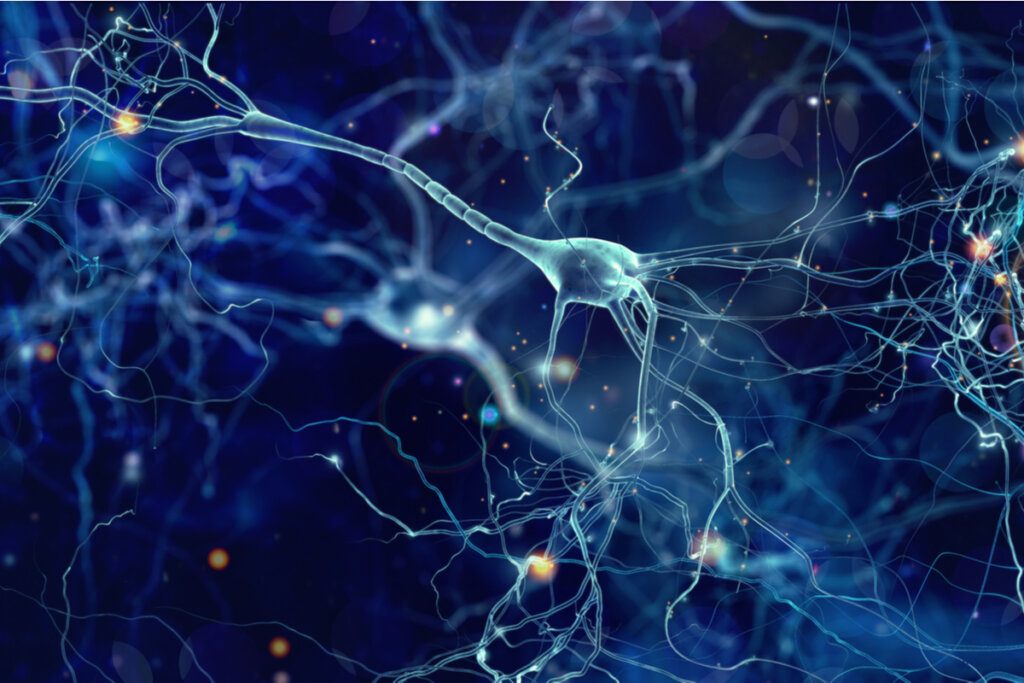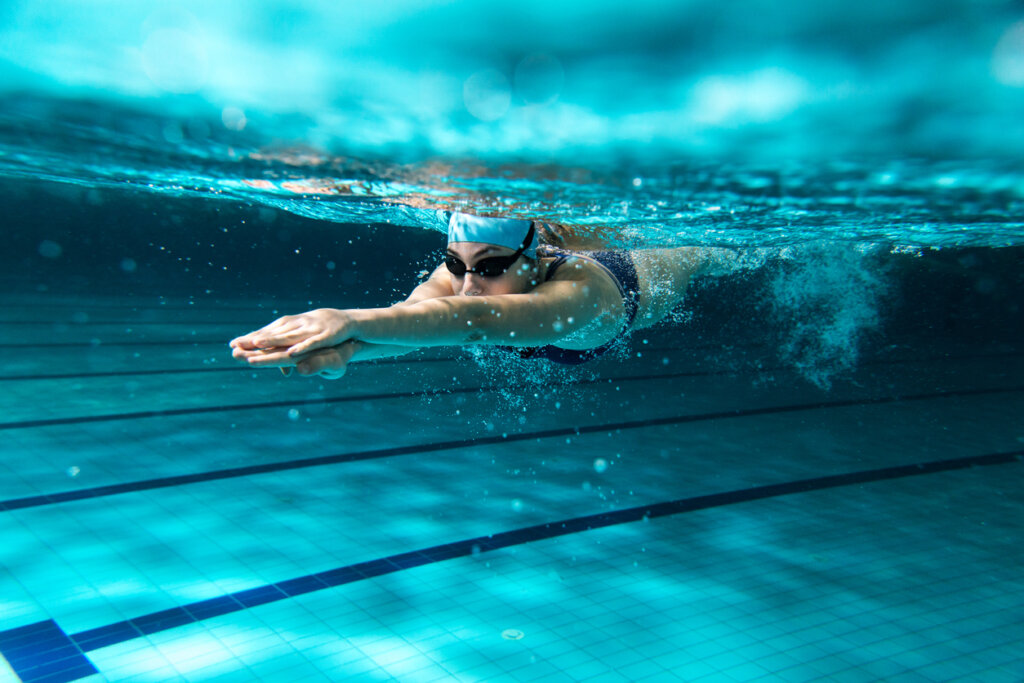Science Claims That Physical Exercise Helps Generate New Neurons

No one doubts the benefits of physical exercise. Not only does it promote good health, but it also has a really positive influence on mood. Now, science has discovered that it also helps generate new neurons.
Since 1964, based on the research of the famous neuroscientist, Marian Diamond, we’ve known that the brain is plastic and adaptive. This overthrew the old belief that it was impossible for new neurons to be generated. In addition, we now also know that physical exercise is one of the promoters/motivators/stimulators of neurogenesis.
As a matter of fact, it’s possible to generate new neurons through proper nutrition, diversity in cognitive activity, exposure to novelty, and a stimulating social environment. The study conducted by Diamond, at the University of Berkeley, and other more current ones, found an important relationship between neurogenesis and physical exercise.
“The brain in motion learns faster.”
-Isabel Maria Martin-
Generating new neurons

A normal brain contains 100 billion neurons, most of which form before birth. In addition, during the early years of childhood, we continue to produce them at a considerable rate. Later, this production slows down. However, the process is maintained throughout life.
Recently, a team of researchers from Harvard University, led by Rudolph Tanzi, published research stating that the hippocampus produces between 700 and 1,500 new neurons per day. This is a really low number of cells, but it makes a valuable contribution to keeping many brain connections active.
This study also investigated the mechanisms capable of stimulating the hippocampus so that it increased the production of new neurons. It revealed some extremely interesting data.
Physical exercise and the generation of new neurons
Mariane Diamond had already explored the relationship between physical exercise and the generation of new neurons. She used rats as experimental subjects. She separated them into two groups: some were kept in a small cage, isolated, and deprived of activity. Others had a larger cage, with different play possibilities and were given a varied diet.
After 80 days, their brains were analyzed. It was found that the cerebral cortexes of the rats in the ‘enriched environment’ had been modified. Their cortexes were larger, they had more blood vessels in the area, and their levels of a protein known as BDNF had increased. The latter is expressed in the cortex and hippocampus and is associated with learning and memory processes.
In Dr. Tanzi’s experiment, conducted with mice, the effect of physical exercise on brain changes and the generation of new neurons was also evaluated. The results were overwhelming. It suggested that aerobic exercise doubled the production of neurons. Furthermore, as well as increasing BDNF, it also increased the production of the enzyme GPLD1, which is involved in neurogenesis.
Transcendental implications

Experiments associated with the link between physical exercise and the production of new neurons have so far been conducted only with animals. However, there’s strong evidence that it would apply to humans as well. What isn’t known yet is what type of aerobic exercise and for what period of time would be most effective.
There are indications that it’d be appropriate to exercise for a period of between 120 and 150 minutes per week. Nevertheless, the available data isn’t strong enough to confirm this hypothesis. Swimming is considered to be the physical exercise with the most benefits in this respect.
It’s clear that physical exercise helps generate new neurons, improves attentional processes, increases cognitive flexibility, and promotes learning and memory. Furthermore, it’s possible that, in a short time, it’ll have a specific application in the treatment of diseases such as Alzheimer’s.
For now, it’s worth taking note of these findings. It certainly seems that adopting the habit of exercising regularly is full of positive consequences. Why not give it a try?
No one doubts the benefits of physical exercise. Not only does it promote good health, but it also has a really positive influence on mood. Now, science has discovered that it also helps generate new neurons.
Since 1964, based on the research of the famous neuroscientist, Marian Diamond, we’ve known that the brain is plastic and adaptive. This overthrew the old belief that it was impossible for new neurons to be generated. In addition, we now also know that physical exercise is one of the promoters/motivators/stimulators of neurogenesis.
As a matter of fact, it’s possible to generate new neurons through proper nutrition, diversity in cognitive activity, exposure to novelty, and a stimulating social environment. The study conducted by Diamond, at the University of Berkeley, and other more current ones, found an important relationship between neurogenesis and physical exercise.
“The brain in motion learns faster.”
-Isabel Maria Martin-
Generating new neurons

A normal brain contains 100 billion neurons, most of which form before birth. In addition, during the early years of childhood, we continue to produce them at a considerable rate. Later, this production slows down. However, the process is maintained throughout life.
Recently, a team of researchers from Harvard University, led by Rudolph Tanzi, published research stating that the hippocampus produces between 700 and 1,500 new neurons per day. This is a really low number of cells, but it makes a valuable contribution to keeping many brain connections active.
This study also investigated the mechanisms capable of stimulating the hippocampus so that it increased the production of new neurons. It revealed some extremely interesting data.
Physical exercise and the generation of new neurons
Mariane Diamond had already explored the relationship between physical exercise and the generation of new neurons. She used rats as experimental subjects. She separated them into two groups: some were kept in a small cage, isolated, and deprived of activity. Others had a larger cage, with different play possibilities and were given a varied diet.
After 80 days, their brains were analyzed. It was found that the cerebral cortexes of the rats in the ‘enriched environment’ had been modified. Their cortexes were larger, they had more blood vessels in the area, and their levels of a protein known as BDNF had increased. The latter is expressed in the cortex and hippocampus and is associated with learning and memory processes.
In Dr. Tanzi’s experiment, conducted with mice, the effect of physical exercise on brain changes and the generation of new neurons was also evaluated. The results were overwhelming. It suggested that aerobic exercise doubled the production of neurons. Furthermore, as well as increasing BDNF, it also increased the production of the enzyme GPLD1, which is involved in neurogenesis.
Transcendental implications

Experiments associated with the link between physical exercise and the production of new neurons have so far been conducted only with animals. However, there’s strong evidence that it would apply to humans as well. What isn’t known yet is what type of aerobic exercise and for what period of time would be most effective.
There are indications that it’d be appropriate to exercise for a period of between 120 and 150 minutes per week. Nevertheless, the available data isn’t strong enough to confirm this hypothesis. Swimming is considered to be the physical exercise with the most benefits in this respect.
It’s clear that physical exercise helps generate new neurons, improves attentional processes, increases cognitive flexibility, and promotes learning and memory. Furthermore, it’s possible that, in a short time, it’ll have a specific application in the treatment of diseases such as Alzheimer’s.
For now, it’s worth taking note of these findings. It certainly seems that adopting the habit of exercising regularly is full of positive consequences. Why not give it a try?
All cited sources were thoroughly reviewed by our team to ensure their quality, reliability, currency, and validity. The bibliography of this article was considered reliable and of academic or scientific accuracy.
- Siteneski, A., Sánchez García, J. A., & Olescowicz, G. (2020). Neurogénesis Y Ejercicios Físicos: Una Actualización. Revista Ecuatoriana de Neurología, 29(1), 125-136.
This text is provided for informational purposes only and does not replace consultation with a professional. If in doubt, consult your specialist.







